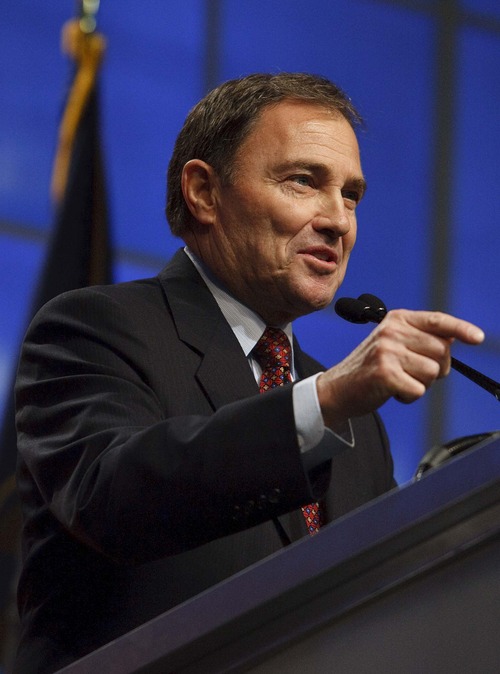This is an archived article that was published on sltrib.com in 2012, and information in the article may be outdated. It is provided only for personal research purposes and may not be reprinted.
Utah Gov. Gary Herbert is asking President Barack Obama to accept the state's health insurance exchange instead of demanding changes called for by federal health reform.
States have until Friday to decide whether to create their own federal exchange, partner with the feds to run one, or default to having the feds operate one for them.
Utah, one of the few remaining fence-sitters, already has an exchange, known as Avenue H, a web-based shopping tool where small-business employees can shop for health insurance using contributions from their employer.
But unlike the exchanges envisioned by the Affordable Care Act, it's not open to individuals. It doesn't impose the same regulatory limits to keep prices in check. People who shop there aren't screened to see if they're eligible for Medicaid or tax breaks to make coverage affordable, and the policies they buy don't have to include minimum "essential" benefits.
In a letter Tuesday to Obama, Herbert said the state is looking to expand Avenue H and open it to individuals and larger businesses.
"However," he said, "we never intended for our exchange to administer Medicaid, enforce the individual mandate [to have insurance], or distribute federal tax credits."
Herbert argues the federal, "government-centric" approach will result "in less [consumer] choice and more reliance on public programs."
The governor asks Obama to instruct the U.S. Department of Health and Human Services to certify Utah's current exchange as being compliant with federal health reform — and to go further.
"I respectfully request that you instruct HHS to declare the Utah exchange model as the minimum federal standard," he wrote. "I am confident that if you make this change, several other states will join Utah and request certification for 'state-based exchanges' based on our model."
The White House did not immediately respond.
The letter is Utah's latest salvo in negotiations with federal officials for flexibility to pursue homegrown health fixes. Herbert touts Avenue H as a success story, the path to health coverage for 318 small businesses and 7,646 workers and their dependents.
But consumer advocates argue the "shop exchange" model has failed to put a dent in the state's 378,000 uninsured.
Federal health reform, by comparison, "is designed to bring everyone into coverage," said Judi Hilman, executive director at the Utah Health Policy Project. "And that's the most cost-effective solution, not just for the uninsured, but for all of us."
An estimated 14 percent to 17 percent of Americans' insurance premiums reflect the cost of charity care given the uninsured, she said. "The sooner we get with the program, the better. The time for posturing is over."
Herbert has yet to make a final decision, his letter suggests. "Time is short. In order for Utah to move forward, I need help from you regarding these requests before [the Dec. 14] deadline," it states.
Nothings bars Utah from operating Avenue H alongside a federal exchange — no matter who runs it.
But the Republican governor walks a fine political line between two camps that appear evenly split on the issue, according to constituent letters obtained by The Salt Lake Tribune through a records request.
In one camp are conservative residents, who, prodded by groups like FreedomWorks, a nonprofit with ties to the tea party movement, see exchanges as the final battle in the war to stop "Obamacare."
"Setting up this exchange will finalize the federal government's takeover of our health care system. Each and every element of our health care insurance will now be subject to approval by bureaucrats in Washington," wrote Evelyne Griffin, of Pleasant View, on Nov. 13.
In another camp are insurance companies, doctors and moderates who say Utah's best chance at controlling its destiny is to move forward on building a federally compliant exchange.
A state-run exchange would capitalize on Utah's young, healthy population and the quality, low-cost health care available here, making insurance options "more affordable than could be offered in a national market," wrote Michael Johnson, an assistant professor of pediatrics at the University of Utah.
Tribune reporter Matt Canham contributed to this report.
Twitter: @kirstendstewart



